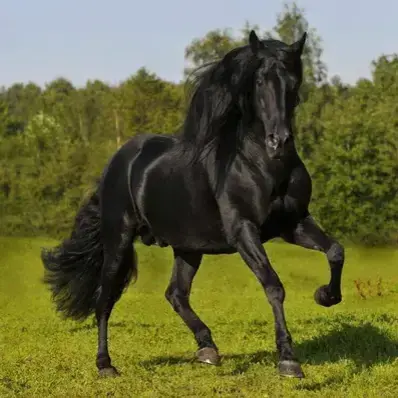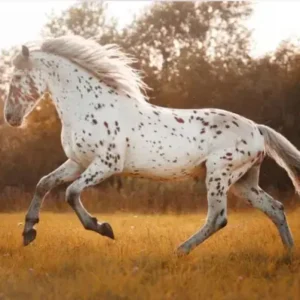History/Origin
The Andalusian horse has its origins in ancient times, hailing from Andalusia, Spain. It’s admired for its grace and adaptability, shaped through breeding with Iberian, Barb, and Spanish Jennet horses. Esteemed by nobles, it symbolizes elegance and strength, with its legacy preserved by dedicated breeders. Today, the Andalusian horse remains a beloved icon of history and a cherished companion to many.
This horse breed is often referred to as the “Royal Horse of Europe” due to its long-standing association with nobility and royalty throughout European history.
Personality
In addition to their striking appearance, Andalusian horses are characterized by their engaging personalities and versatile abilities. Here are some traits of their personalities.
- Friendly Nature
Andalusian horses are known for their friendly and approachable behavior, making them great companions for riders. They enjoy interacting with people and are quick to form bonds with their handlers.
- Intelligent Companions
These horses are smart and can easily understand commands from their riders. Their intelligence allows them to learn new skills quickly and excel in various activities like riding and working.
- Calm and Cooperative
Andalusians have a calm and cooperative attitude, which makes them easy to train and handle. They respond well to gentle guidance and enjoy working with their owners to accomplish tasks.
- Affectionate Personalities
With their affectionate personalities, Andalusian horses form strong bonds with their human companions. They enjoy spending time with people and thrive on the attention and care they receive.
- Versatile Performers
Andalusians are versatile performers, excelling in a wide range of equestrian disciplines. Whether it’s dressage, trail riding, or competitive events, these horses adapt well to different activities and environments.
Physical Appearance
Let’s explore some Andalusian horse characteristics that make this an exquisite breed of pet animals.
- Size
Typically, the average Andalusian horse size stands between 15.1 to 16.2 hands tall, boasting a robust build and well-proportioned physique. Their sturdy stature and graceful proportions contribute to their majestic presence.
- Coat Color Variety
The Andalusian horse colors are varied, with rich and graceful-looking color coats. These horses also exhibit rich hues in other shades. Their coats often feature a glossy sheen, which enhances their overall appeal and elegance.
Having said that the most common color coats are:
- Black Andalusian horse
- White Andalusian horse
- Grey Andalusian horse
- Bay Andalusian horse
- Buckskin Andalusian horse
- Perlino Andalusian horse
- Chestnut Andalusian horse
Gender Differences
There are some notable differences between the appearance of both male and female Andalusian breeds.
Such as:
- Males (Stallions)
The Andalusian Stallions, or males, tend to be larger and more muscular than their female counterparts. They often exhibit more prominent necks and thicker body frames, reflecting their strength and power.
- Females (Mares)
Mares, the female Andalusian horses, typically have a slightly smaller and more refined build compared to stallions. They may possess more graceful and elegant features, with a slender neck and a sleeker body profile.
Feed/Nutrition
Andalusian horses require a balanced diet to maintain their health and vitality. Here’s how you can keep your Andalusian horse healthy.
- Hay and Grass
Hay is an important part of an Andalusian horse’s diet. It gives them the fiber they need for digestion. Letting them graze on grass when possible helps them get extra nutrients and satisfy their natural instincts.
- Grains and Supplements
Sometimes, these horses also eat grains and special supplements for extra energy and nutrients. It’s important not to give them too much to keep them at a healthy weight.
- Hydration
Making sure they always have clean water to drink is really important for these pure Spanish horses. Water helps them digest food, stay cool, and stay healthy.
Common Health Problems
Here are some common health issues that Andalusian horses may face during their lifetimes:
- Colic: Colic is a common digestive issue in horses and can be caused by factors like changes in diet, stress, or intestinal blockages
- Laminitis: Laminitis is a painful condition affecting the hoof laminae, often triggered by factors like overeating, obesity, or metabolic issues
- Respiratory Problems: Respiratory issues such as equine asthma or heaves can arise from exposure to dust, allergens, or poor ventilation in the barn
- Joint Problems: Andalusian horses may experience joint issues like arthritis or osteoarthritis, especially as they age or due to strenuous activities
- Dental Problems: Dental issues like uneven wear, sharp points, or dental infections can affect chewing and overall health
To safeguard the health and well-being of Andalusian horses, owners should implement key preventive measures. These include scheduling regular veterinary check-ups, maintaining a balanced diet with quality hay and supplements, ensuring proper hoof care, keeping a clean living environment, and scheduling routine dental exams.
Care and Grooming Practices
Caring for an Andalusian horse means keeping their home clean and dry, like a big, comfy stall or paddock. Brushing their coat, mane, and tail often helps them stay clean and feel good. It’s important to check their hooves for dirt and any signs of sickness to keep their feet healthy.
They need fresh water and good hay to eat every day to stay healthy. Andalusian horses also need time to run and play in a field or pen to stay happy and healthy. This lets them stretch their legs and be with other horses, which makes them feel good.
Rescue Groups
In cases where Andalusian horses need rescue or rehoming, several organizations provide dedicated support and care for these majestic animals.
Andalusian Horse for Sale
You can buy Andalusian horses from one of the following reputable organizations:
Interesting Facts
Andalusian horses have some remarkable qualities that make them stand out in the world of horses.
- They initially served various roles, including classical dressage, carriage driving, bullfighting, and stock horses.
- The Andalusian horse is also called “Pura Raza Española” (PRE), which means “Pure Spanish Horse,” highlighting its Spanish roots.
- This breed shows off their skills at prestigious events like the World Equestrian Games, where they compete in different sports.
- They even starred in movies like “The Lord of the Rings,” where they played as war horses, adding to their fame and recognition.
Best For
Andalusian horses are great pets for anyone who values a gentle and smart companion. Whether you’re a beginner or an experienced rider, Andalusians adapt well to various equestrian activities.
Families seeking a versatile and friendly horse for leisure riding or local shows will find Andalusians to be a perfect fit. Their calm nature also makes them ideal for riders looking for a reliable partner. With their adaptability and friendly demeanor, Andalusians make wonderful companions for anyone seeking a loyal equine friend.
Top Names
Here are some Andalusian horse names if you want to keep these royal horses as pets:
| Male Andalusian horse Names | Female Andalusian Horse Names |
| Max | Bella |
| Duke | Luna |
| Apollo | Daisy |
| Shadow | Rosie |
| Titan | Coco |









